Abul Faraj Abdur Rahmaan ibn al Jawzi rahimahullah was a scholar par excellence, a prolific author and a profound thinker. He was a model for high ambition, time management and effective execution of goals. He wrote his at times candid confessions and profound reflections in his book Sayd al Khatir (Captured Thoughts). This is the original self-help book written in the 12th century. It is an especially useful work for scholars who need to address the communal and personal challenges they face.
Among the maxims he sets out in his book is the following:
“Among the signs indicating the perfection of a person’s intellect is his high aspirations. Anyone who suffices with being below par and settles for less than what he is capable of, is worthless and not living up to his potential. I have not seen a worse fault in people than someone being mediocre when he has the ability to achieve greater things and is perfectly capable of perfection.”
In essence, we need to set our sights high and become ambitious.
The Prophet sallallahu alaihi wa sallam inspired the Sahaba radhiallahu anhum and the succeeding generations to come to aspire to high aspirations. He advised us when asking Allah Ta’ala for Paradise to ask for Firdous, the highest part of Paradise. Above it is the Arsh (Throne) of Allah Ta’ala and from it the flowing rivers of Paradise originate. (Bukhari) This motivated millions of people to aim for the highest Paradise, and not be content with just making it through the door.
The Prophet sallallahu alaihi wa sallam was once hosted well by a Bedouin. The Prophet sallallahu alaihi wa sallam told him to ask for what he wanted. The Bedouin asked for a she-camel with a saddle and a few sheep whose milk would be enough for his family. The Prophet sallallahu alaihi wa sallam told him, “Was it not possible for you to ask me as the old woman of the Israelites asked Prophet Musa alaihis salaam?” When the Israelites were lost trying to leave Egypt, their scholars said that they would find the way if they took the body of Prophet Yusuf alaihis salaam with them. The only person who knew the location of his body was an old woman. She agreed to show them on condition that she be with Prophet Musa alaihis salaam Paradise. He accepted when revelation came to him in this regard.
This old lady seized the opportunity to gain the best out of a situation.
The Noble Quran uses this motivation towards being the best to great effect. It draws our attention to the skies, and Muslims produced class leading astronomers. It asks us to look at the crops, and Muslims excelled in agriculture. The Prophet sallallahu alaihi wa sallam said that every disease has a cure and as a result Muslims were motivated to search for those cures and produced the best physicians. Islam encourages us towards education and Muslims produced renowned universities and scholars of the highest caliber.
The Prophet sallallahu alaihi wa sallam foretold a number of conquests including those of Rome, Persia, Egypt, Yemen, India and Constantinople by the Muslims. These became goals which drove the Muslims to challenge not just one but multiple empires simultaneously. Within a few short years the rule of the ancient Persian Empire was decimated never to rise again, Yemen was in Muslim hands and the Romans were swiftly dispossessed of their Syrian provinces. Ancient Egypt came under Muslim sway.
The Prophet sallallahu alaihi wa sallam prophesied the conquest of Constantinople (today’s Istanbul in Turkey) by saying, “Constantinople will certainly be conquered. How excellent will be the leader, and how excellent an army will that be.” This became a motivation for Muslims to aspire to.
The city of Constantine stood for over a thousand years as the capital of the Roman Empire and then the Byzantine Empire. It was the largest and wealthiest city in Europe for several centuries and held some of Christianity’s holiest relics. Its complex defenses were famous with massive walls. 23 armies tried to take it and failed.
The first Muslim army to try was in the reign of Hazrat Muaawiya radhiallahu anhu. In this army was the great Abu Ayyub Ansari radhiallahu anhu, the first host of Nabi sallallahu alaihi wa sallam in Madinah Munawwarah. By this time he was old but insisted on joining the expedition. He fell ill and instructed the soldiers to advance with his body when he died and bury him at the walls of Constantinople. This locality is today known as Ayyub in Istanbul.
A youngster of 21, Sultan Mehmed II of the Ottoman Empire sets his sights on this trophy. He did not let the fact that so many had failed deter him from this lofty ambition. Everything fell into place: The Turks had the largest rapid cooling canons of the time constructed and they gathered intelligence by exploiting the Orthodox-Catholic rift. His master stroke was to bypass the sea chains of the city and roll his ships overland into the unprotected seas behind the barriers. After 53 days of relentless siege he walks into Hagia Sofia as a conqueror. In so doing he crushed the last remnants of the once great Roman Empire.
Aspire to be the best in all the fields we enter. Don’t be content with being average. Live up to your full capability. And ultimately we should aspire for a beautiful death with Imaan, the best of graves, and not be content with anything but the best Paradise.
It comes at a price. We need to work towards these aspirations by becoming pious and living the life that Allah Ta’ala wants us to live. Don’t worry about whatever is behind you. Aim for the future. Umar ibn Abdul Aziz rahimahullah, the Umayyad Caliph, is judged basically on his last two years of his life as an incorruptible, pious leader.
Aiming for the highest achievements does not mean we will not fail. Abraham Lincoln lost his job, eight different elections and failed in business twice before making it. Many of life’s failures are people who did not realize how close they were to success. We need to make it our ambition to pursue excellence in all things in this world and beyond into Paradise.


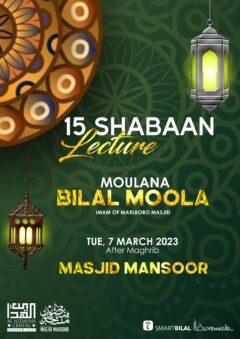

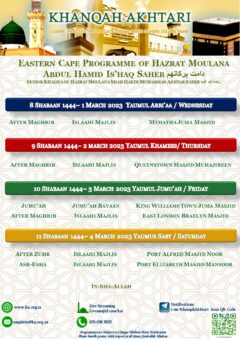
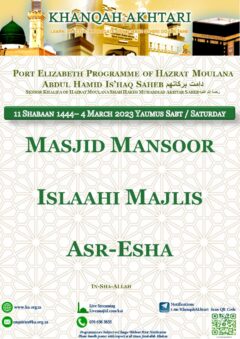
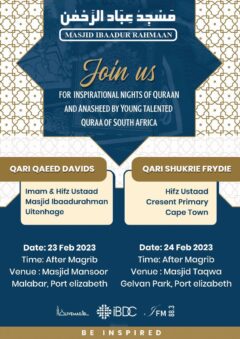
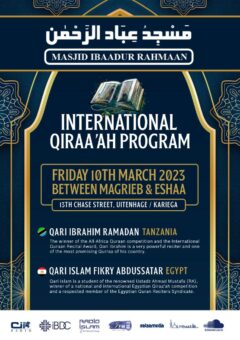



COMMENTS